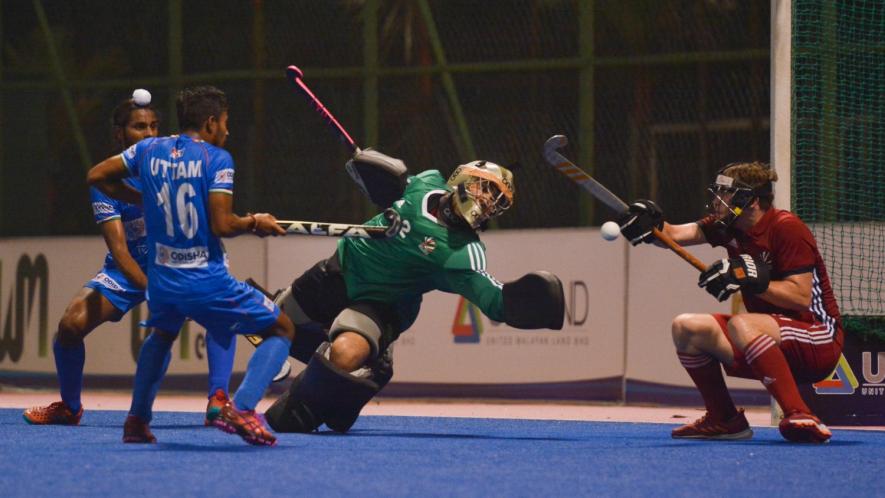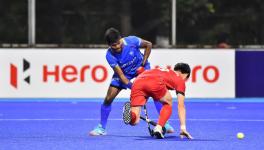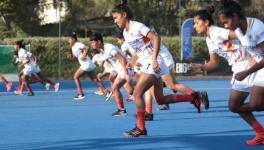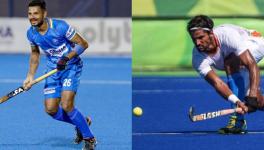Sultan of Johor Cup Review: Future of Indian Hockey in Nobody’s Hands

Indian junior men's hockey team, despite creating a lot of openings, lost to Great Britain through a goal in the dying seconds at the Sultan of Johor Cup in Malaysia on October 19.
There was one minute to go in Indian junior men’s hockey team’s game against Great Britain in the Sultan of Johor Cup final, the game on course to go to a shootout, when a long driven ball from the defender Ioan Wall found its way to James Oates inside India’s circle. Oates deflected it towards goal, but Prashant Chauhan, India’s goalkeeper, parried it out. Oates almost immediately held his head in his hands in despair. This was his golden opportunity to snatch the game at the death, write the headlines and earn the accolades. And he’d missed it.
Except the ball was still in play. India, in panic mode, couldn’t clear it away. Five seconds after Wall’s initial miss, Stuart Rushmere found the elusive winner. Right at the death, Great Britain had nicked it. Rushmere sparked the celebration frenzy, running off to a corner hands aloft in the air. Oates was the first to join him.
For India, a collective shoulder slump. This felt like being stuck in a recurring nightmare. A feeling that has persisted and carried on among all manner of Indian hockey teams for the better part of two decades now, but is loath to go away. The junior team captain Mandeep Mor walked off the pitch in disgust, admonishing whichever teammate had the temerity to walk next to him. But the truth was, the faults go deeper.
Video | South Africa Cricket Team's Slump vs India and the Big Rot Back Home
“Why do teams concede last minute goals?” V Baskaran throws the question back. “It happens because you lose focus in the dying minutes and are already thinking of what is to happen next.”
The former India skipper and coach’s reasoning isn’t new. Over the course of the past few years, every time India has conceded a goal in the dying minutes of a game everyone has spoken about this. A lack of exposure, an inability to deal with pressure, complacency, match fitness, the excuses roll of the tongue.
The larger fear — one perhaps now realised — is that this problem isn’t being tackled early enough in the system. The juniors have finally picked up the bad habits of their senior counterparts. A considerable number of players in the squad have already earned senior team caps, but despite the experience — or perhaps because of it — the nervous niggles remain. And with a Junior World Cup on the horizon, a clean up operation is key.
The problems for Indian hockey, almost always have been at the back. Rarely do countries get so much attacking talent stacked up in a junior side. The last batch of World Cuppers en masse walked into the senior team — aided no doubt by the elevation of their coach Harender Singh to the senior job. Even in the current pool, the availability of attacking talent is outrageous. At the Sultan of Johor Cup alone, India scored 24 goals in six matches, a neat average of four goals a game. They scored a minimum of three in every pool game in the tournament. And yet, they conceded 13 goals through the tournament and did not keep a single clean sheet.
Also Read | MC Mary Kom vs Nikhat Zareen: The Bout Indian Boxing Needs But May Not Get
In sharp contrast, Great Britain, the eventual champions, scored ten goals through the tournament and conceded a mere six. That Jose Mourinho quote about attacks winning matches and defence winning tournaments couldn’t have been more apt.
It wasn’t so much the goals conceded, but the way in which they were. Against Japan in a pool encounter, India were at one stage down 4-1. Japan’s fourth was a horror movie played out on blue turf. A long ball launched from deep in their own half, a defender caught on his heels, freezing in the moment, a goalkeeper out of position and a Japanese forward gratefully accepting the gift of a free goal. Even at the Senior Nationals B Division, goals are tougher to come by.
In response to that bruising 4-3 loss, India demolished Australia 5-1. It was the biggest margin of victory for India against the Kookaburras since 1935, when India beat them 12-1 in a Test match — also the first time the two sides met on a hockey pitch. And then, in the next pool game against Great Britain, again India went down 2-0, before digging themselves out of the hole bravely in a final quarter burst to lead 3-2. Guess what happened next?
Great Britain scored an equaliser in the 59th minute.
“At a camp, players aren’t playing tough matches that go from the first minute to the last,” Baskaran said, “ Even at the nationals, more often than not they will play teams that give up once they are two or three goals down. It’s basically a walkover from there. But at the international level, that is not the case.”
In the buildup to the 2016 Junior Hockey World Cup, Hockey India organised multiple exposure tours for its junior team. Keen to avoid the humiliation of the 2013 edition, when as hosts they had crashed out in the group stage, a plan for domination was in place. Harender Singh was given time with the squad and almost without exception the players were regularly playing in the junior squad. Those called up to the seniors were shuttered back quickly to impart their experience gathered.
Also Read | IAAF World Championships: The Indian Athlete and the Spinning Vortex of Failure
But to truly understand how ‘revolutionary’ and far reaching that plan was here’s a reality check. The current junior men’s team does not even have a coach. Since the sacking of Jude Felix in June this year, no appointment has been made. Hockey India extended the deadline for applications four times, but according to sources, no one has come forth. In this current impasse, BJ Cariappa has been at the helm — despite not having being officially appointed to the post.
While the Sultan of Johor could well prove to be a minor blip in an otherwise excellent future — for the record the junior team went down to Great Britain in 2018, in the final of the tournament too — it is the lack of administrative competence that is extremely galling. India are the junior world champions. You’d expect excellence to continue. Why, the simple question, is there no plan for the future?
The (International Hockey Federation) FIH provides an answer. Perhaps there is no future. At the World Cup in Bhubaneswar last year, FIH CEO Thierry Weil had said that a plan was in place to ensure the Junior World Cup gets staged every two years. “We need to support youth in sport and give every generation a chance to participate in Junior World Cup. If we don't, we lose a generation of players," he said at a press conference called exclusively for this. "We will start bids for potential candidates for the Junior World Cup soon. This decision will also have to be taken in 2019."
As of now, their official website does not list dates or a venue for the next edition of the Junior World Cup. It just states what happened in the past.
Get the latest reports & analysis with people's perspective on Protests, movements & deep analytical videos, discussions of the current affairs in your Telegram app. Subscribe to NewsClick's Telegram channel & get Real-Time updates on stories, as they get published on our website.
























